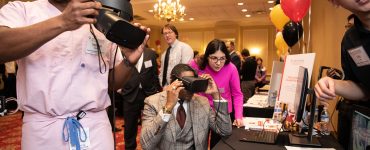Patricia Florestano, PhD, MA, is a lifelong educator committed to improving higher education in Maryland for all. She received her PhD in Public Administration and American Government from the University of Maryland, College Park (UMCP) in 1974. She taught political science at the UMCP Institute for Urban Studies from 1974-79 and later became a professor of public affairs and senior research fellow in the Schaefer Center for Public Policy at the University of Baltimore.

Outside of the classroom, she served as director of the University of Maryland Institute for Governmental Service from 1979-84, leading a team that worked to bridge the gap between education and government. In 1985, she was appointed vice chancellor of the University System of Maryland (USM).
During her doctoral work, Florestano received mentorship from Parris Glendening. When he was elected governor of Maryland in 1994, Glendening asked Florestano if she would serve as the Secretary of Higher Education. Her husband had just retired as the president of Anne Arundel Community College and she was looking forward to retiring with him in Florida. Knowing that she could do a lot of good in the role, her husband persuaded her to take the job. Reflecting on her time as secretary, she said the legislature was full of good, hardworking people. She could talk about higher education with everyone because it was a priority for both Republicans and Democrats.
After her term as secretary, Florestano was appointed to the USM Board of Regents in 2001, where she served for 15 years. She has lent her expertise to the University of Maryland, Baltimore (UMB) as a trustee of the UMB Foundation since 2015.
What are you most proud of accomplishing during your term as Maryland Secretary of Higher Education?
Since Gov. Glendening had been a college professor, he understood the needs in higher education, which allowed us to accomplish a lot of good. We built new merit-based scholarships and removed barriers for students transferring from community colleges to four-year institutions. We examined obstacles that prevented students from graduating in four years and worked to remove them. After five years as secretary, I stepped down and was added to the USM Board of Regents. The university faculty appreciated having their voice represented on the board by a former university professor, and I was able to advocate for ideas that mattered to them.
How did you first get involved with UMB?
While on the Board of Regents, I built a relationship with then-president Dr. Jay Perman, and he asked if I would join the UMB Foundation Board of Trustees. I always thought UMB was such a wonderful campus. I loved the interdisciplinary strengths and how the variety of its mission made major contributions to Baltimore City. When the plan to merge UMB and UMCP was put forth, I argued that what UMB offers Baltimore City is crucial and can’t be lost in a merger. Ultimately, they ended up with a wonderful compromise that allowed students to enroll in joint programs and experience the benefits of both campuses while preserving UMB’s footprint in Baltimore City.
What are the biggest challenges facing students today?
COVID-19 has been a scene-changer. There is a lot to rethink in higher education, which doesn’t change easily. We have to figure out how to offer hybrid learning environments. We have to educate our professors on online or hybrid instruction. We have to ensure that our students have virtual connections to resources like the library and faculty. We have to be prepared to figure out the economics. Ultimately, we have to figure out what our new normal will be.
What is your hope for the future of higher education?
We have to make higher education available and affordable, but we also have to recognize that not every student needs a four-year degree. Whether that means access to local trades, specialized academies, commercial training in high school, or higher education, people need access to something that will give them a valuable life.
“UMB is such an active part of Baltimore City. There are things we’ve been doing for years — like the Maryland Poison Center at the School of Pharmacy and the School of Dentistry’s clinical services — that help so many people. I’ve always admired the way research and teaching are intertwined and the disciplines are brought together in clinical settings to solve problems. I don’t know what Baltimore City would do without it.”
— Patricia Florestano
The UMB Foundation serves as the fiscal agent for the University of Maryland, Baltimore (UMB), Maryland’s only public health, law, and human services university. UMB is composed of six professional schools (dentistry, law, medicine, nursing, pharmacy, social work) and the interdisciplinary Graduate School. Its mission is to improve the human condition and serve the public good of Maryland and society at-large through education, research, clinical care, and service.




